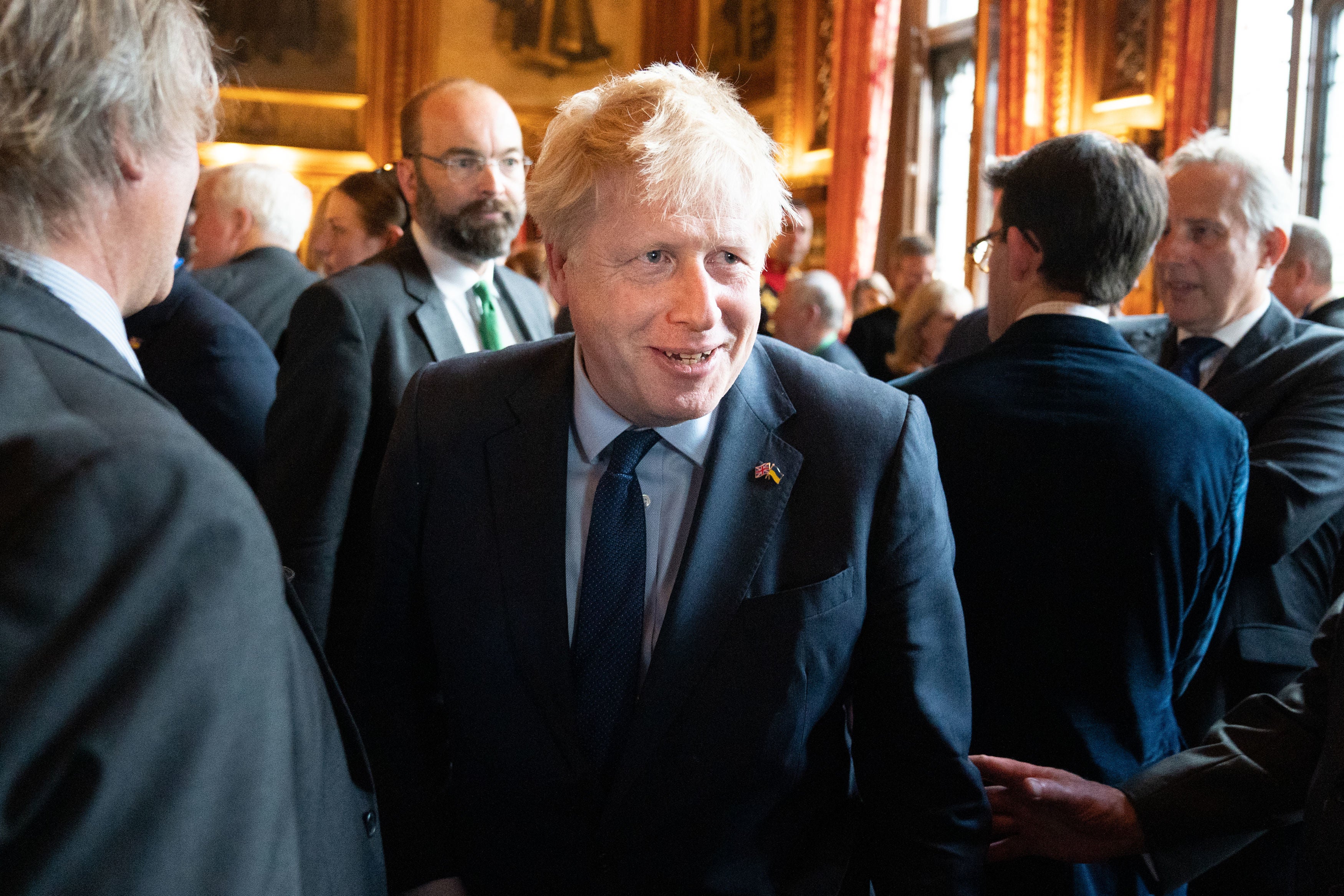Will Boris Johnson resign after double by-election disaster?
PM facing renewed pressure to step down after Tory thrashings in West Yorkshire and Devon and resignation of party chairman Oliver Dowden
Boris Johnson has vowed that he will “keep going” as prime minister despite the Conservative Party’s crushing double by-election defeat in Wakefield and Tiverton & Honiton.
In West Yorkshire, Labour’s Simon Lightwood defeated Tory Nadeem Ahmed to replace the disgraced Imran Ahmad Khan while, in Devon, Liberal Democrat Richard Foorde overturned a Conservative majority of 24,000 to beat Helen Hurford to the seat previously held by Neil Parish, who was forced to step down after being caught streaming pornography on his phone in the House of Commons.
To make matters worse, party chairman Oliver Dowden subsequently announced his resignation in the early hours of Friday morning, telling the PM: “We cannot carry on with business as usual. Somebody must take responsibility and I have concluded that, in these circumstances, it would not be right for me to remain in office.”
Responding to the historic and humiliating results – only the latest disaster to hit his ever-embattled leadership – Mr Johnson promised to “listen” to voters.
“It’s absolutely true we’ve had some tough by-election results,” he said, speaking during a visit to Rwanda to meet with Commonwealth leaders.
“There’s been, I think, a reflection of a lot of things, but we’ve got to recognise voters are going through a tough time at the moment. I’ve got to listen to what people are saying, in particular to the difficulties people are facing over the cost of living.”
Declaring that the economy remained the “number one issue”, the PM added: “We’ve got to recognise there is more we’ve got to do and we certainly will, we will keep going, addressing the concerns of people until we get through this patch.”
This latest setback for Mr Johnson follows weeks of negative headlines for his government over its failure to mediate RMT-led national rail strikes, the European Court of Human Rights intervening to ground refugee deportation flights to Kigali, the prospect of the peace process being imperilled in Northern Ireland by the tearing up of a key Brexit agreement, the resignation of Lord Geidt as his chief ethics adviser over a trade policy that threatened to break international law and allegations that his office pressured The Times into spiking a story about his lobbying for his wife Carrie Johnson to be given a government job.
All of which has happened since the bruising no confidence vote in the Commons on 6 June, which was triggered after more than 54 of the PM’s fellow Conservatives sent letters to Sir Graham Brady’s powerful 1922 Committee of backbenchers protesting his ongoing leadership.
Mr Johnson won the ballot in the House of Commons by 211 votes to 148 but the outcome was perilously close and saw 41 per cent of Tories support his ousting, leaving him free of further challenges to his authority for the meantime but badly wounded nonetheless.
Sir Graham’s announcement – immediately following the Platinum Jubilee celebrations for the Queen, at which Mr Johnson was booed on the steps of St Paul’s Cathedral – that the threshold for disquiet had been passed and a referndum on the PM’s survival itself came hot on the heels of the publication of Sue Gray’s report into rule-flouting in Downing Street and Whitehall during the coronavirus pandemic.
That scandal, popularly known as “Partygate”, had dogged Mr Johnson’s every waking hour for six months and promises to haunt him for some time to come.

Ms Gray, a respected veteran civil servant, was appointed in December 2021 to investigate a string of illicit drinks parties held behind closed doors at Westminster during lockdown when the public were being ordered to observe strict social-distancing laws and stay at home to prevent the spread of Covid-19.
Her inquiry was delayed by the Metropolitan Police launching an investigation of its own based on the evidence she had collected, which ultimately led to 83 individuals receiving 126 fixed-penalty notices, the PM, Ms Johnson and chancellor Rishi Sunak among their number and forced to fork over £50 each.
That development, meaning Mr Johnson had broken the law in office and revived calls for his defenestration after he appeared to have weathered the worst of the storm of indignation that threatened to topple him in December and January, a period when fresh stories about the scandal appeared almost daily in the press carrying anecdotes about wine fridges, “BYOB” garden parties and Christmas quizzes, infuriating members of the public who had been denied the opportunity to spend time with sick or dying loved ones out of respect for the laws this same government had imposed to keep Covid at bay.
Following the eventual conclusion of the Met’s inquiry, Ms Gray was finally able to publish her dossier in full (a 12-page “update” had appeared on 31 January) on 25 May, which carried photographs and further lurid details of security staff being insulted by drunken revellers, janitors left to sponge claret stains from the walls of the corridors of power and staff stumbling out of “work events” in the early hours of the morning surreptitiously via a rear door.
“There were failures of leadership and judgement by different parts of No 10 and the Cabinet Office at different times,” Ms Gray concluded.
“Some of the events should not have been allowed to take place. Other events should not have been allowed to develop as they did.”
While Mr Johnson might have hoped his subsequent apology would draw a line under matters, he must still appear before the Commons Privileges Committee to answer questions about whether he knowingly misled Parliament about Partygate, having regularly denied holding any prior knowledge about what went on.
The PM has repeatedly insisted that supporting Ukraine and reining in inflation are more important issues and attempted to defend his record by citing the speed of the UK vaccine rollout last year but few are convinced by his rhetoric and many of his own MPs remain incensed.
Despite his slim confidence vote victory in the Commons, their stinging verdicts on his conduct have made a deep impression on the public, many of whom are every bit as appalled as their elected representatives.

Among high-profile Tories to have been particularly scathing about the PM’s ongoing leadership is Tom Tugendhat, chair of the Foreign Affairs Committee, who said: “No 10 is the UK’s strategic headquarters, it has the responsibility to maintain operational capability whatever the circumstances.
“The prime minister put the governance of the UK at risk to a single, severe Covid outbreak. That is to say nothing of the lack of respect it showed for the British people or the Queen.”
Long-time critic Tobias Ellwood meanwhile rebuked him for seeking to distract from his problems with frivolous but headline-grabbing initiatives like the announcement of a consultation on the return of imperial weights and measures, a gesture intended to appeal to the party’s most rabid Brexiteers.
Mr Ellwood dismissed the venture as a sign his fellow Conservatives were “in denial” about the threat of ejection from office at the next election, describing it as “far from the inspirational, visionary progressive thinking that we require”.
Another veteran MP, who spoke to The Independent on condition of anonymity before the 6 June vote, said: “At the moment there is no obvious alternative leader for people to coalesce around.
“But the problem, as Theresa May found, is that simply being forced to a vote leaves you wounded, potentially terminally. After that first vote, I think people who see themselves as future leaders will put their heads above the parapet and say that they are ready to stand for election, and that changes the landscape considerably.
“He needs to provide some months of diligent and competent government, doing some solid work on which he can be judged. And frankly, we need to see a little less of him.”
Join our commenting forum
Join thought-provoking conversations, follow other Independent readers and see their replies
Comments



Bookmark popover
Removed from bookmarks